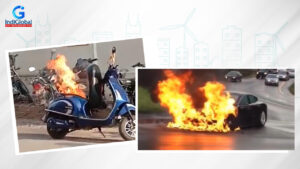Kaniza Garari
IndiGlobal Media Network

Standardization is important as there are different combinations of batteries that are available in the market and they are not able to handle the extreme temperatures in different regions of India.
Due to this reason, the summer of 2022 has noted incidents of Electric Vehicles especially scooters catching fire.
To ensure that these incidents do not occur Ministry of Power and Government of India and NITI Aayog are looking at creating an eco-system for increasing the manufacturing of local batteries. This is keeping in mind, the extreme climatic conditions of different regions in India.
Singh says, “There are four main stakeholders in the battery management process. We are focusing on Battery Swapping Policy which will make it easier for the buyers to have confidence in EV. With changing technology and advances from time to time, BSP will be the road ahead. A Unique Identification Number is also planned for this and that will make the process viable for the manufacturers and also the users.”
The other concerns raised are power shortages during summer in India. Due to the rising heat conditions, every year, the power sector faces shortages as there is an increase in consumption. With the use of electric vehicles, the demand for power will increase and it will require balancing it with industry, residential and also transportation.
Nitin Seth, Chief Executive Officer, New Mobility, Reliance Industries explains, “We are looking at Solar Power to meet the huge EV demand by 2030. The projections are 30 percent of the vehicles by 2030. To meet the huge demand alternate energy resources will be required to charge the EVs. There is also a need to manufacture the battery cells in India. While the demand for EVs is growing due to the rising petrol prices but the cost of the batteries is not coming down. Earlier the projection was that rising demand would bring down the cost of batteries. Instead, we are seeing that prices are going high.”
- Battery combinations are not keeping the temperatures of 40 to 45 degrees in India
- Technical knowledge of battery combinations in human resources is minimal and they require to be upskilled
- Standardization of the main component of batteries is most important.
- Local manufacturing is also required along with upskilling of the organized and also the informal sector which carries out maintenance of vehicles that are an important segment in the EV growth
- It is not just plug-and-play and requires technical expertise at the factory and also at the maintenance level.
- Finance for EV vehicles is not available from banks which are deterring consumers.
- The main focus for India is two and three-wheelers as they will set the roadmap for EVs in the country.
The EV phase of India requires a more coordinated and planned approach as the demand will rise. Given the conditions of the Ukraine War, rising oil prices and the need for alternate energy resources to control carbon emissions.